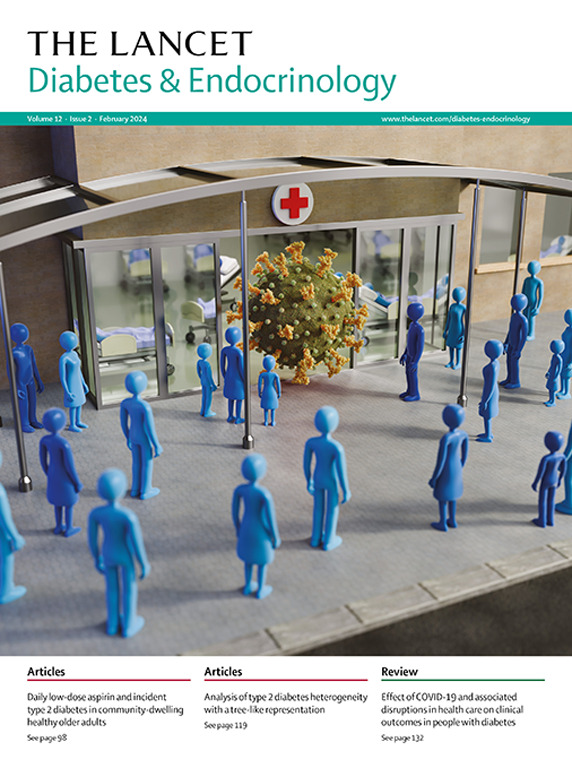Once‑weekly IcoSema versus once‑weekly insulin icodec in type 2 diabetes management (COMBINE 1): an open‑label, multicentre, treat‑to‑target, randomised, phase 3a trial
IF 44
1区 医学
Q1 ENDOCRINOLOGY & METABOLISM
引用次数: 0
Abstract
Background
IcoSema is a once‑weekly combination therapy of basal insulin icodec (icodec) and semaglutide (a GLP‑1 analogue) currently in development. COMBINE 1 compared the efficacy and safety of IcoSema with once‑weekly icodec alone in adults with inadequately controlled type 2 diabetes on daily basal insulin therapy.Methods
COMBINE 1, a 52‑week, open‑label, treat‑to‑target, randomised, phase 3a trial, was done at 192 outpatient clinics and hospital departments across 20 countries and regions. Individuals aged 18 years or older with a BMI of 40 kg/m2 or less and type 2 diabetes (HbA1c 7·0–10·0% [53·0–85·8 mmol/mol]) treated with daily basal insulin with or without oral glucose‑lowering medications were randomly assigned (1:1) via a randomisation and trial supply management system to IcoSema (700 U/mL plus 2 mg/mL) or icodec (700 U/mL), both administered as subcutaneous injections on the same day each week, at any time of the day. There was no stratification based on participants' baseline characteristics. The primary endpoint was change in HbA1c from baseline to week 52, evaluated in the full analysis set (all randomly assigned participants). The trial is registered with ClinicalTrials.gov, NCT05352815, and has been completed.Findings
Between June 1, 2022, and March 13, 2023, 1671 individuals were screened, of whom 1291 (mean age 60·6 years [SD 10·3]; 799 [62%] males and 492 [38%] females) were randomly assigned to IcoSema (n=646) or icodec (n=645). At week 52, from a baseline value of 8·22% (SD 0·83; 66·3 mmol/mol [9·1]), estimated mean change in HbA1c was −1·55 percentage points (SE 0·03; −16·9 mmol/mol [0·4]) with IcoSema and −0·89 percentage points (SE 0·03]; −9·7 mmol/mol [0·4]) with icodec (estimated treatment difference [ETD] −0·66 percentages points [95% CI −0·76 to −0·57]; −7·3 mmol/mol [−8·3 to −6·2]; p<0·0001; superiority confirmed). The rate of combined clinically significant or severe hypoglycaemia from baseline to week 57 was significantly lower with IcoSema than with icodec (0·14 vs 0·63 episodes per person‑year of exposure; estimated rate ratio 0·22 [95% CI 0·14 to 0·36]; p<0·0001; superiority confirmed). The most frequently reported adverse events were within the system organ class of gastrointestinal disorders in the IcoSema group (303 [47%] of 644 participants had 1033 events during the trial) and infections and infestations in the icodec group (275 [43%] of 644 participants had 466 events. 59 (9%) participants in the IcoSema group and 69 (11%) participants in the icodec group had a serious adverse event. No treatment-related deaths occurred.Interpretation
In adults with inadequately controlled type 2 diabetes on daily basal insulin therapy, once‑weekly IcoSema showed superiority to once-weekly icodec alone in changes in HbA1c and in overall lower rate of combined clinically significant or severe hypoglycaemia. IcoSema might provide an option for insulin therapy intensification in adults with type 2 diabetes.Funding
Novo Nordisk.Translations
For the Chinese and Japanese translations of the abstract see Supplementary Materials section.每周一次IcoSema与每周一次胰岛素icodec在2型糖尿病治疗中的对比(COMBINE 1):一项开放标签、多中心、从治疗到目标、随机、3a期试验
dicosema是目前正在开发的每周一次的基础胰岛素icodec (icodec)和semaglutide(一种GLP - 1类似物)联合治疗。在控制不充分的成人2型糖尿病患者每日基础胰岛素治疗中,COMBINE 1比较了IcoSema与每周一次单独使用icodec的疗效和安全性。方法:combine 1是一项为期52周、开放标签、治疗到目标、随机化的3a期试验,在20个国家和地区的192个门诊诊所和医院部门进行。年龄≥18岁、BMI≤40 kg/m2、2型糖尿病(HbA1c 7.0 - 10.0% [53.3 - 85.8 mmol/mol])患者每日基础胰岛素治疗,并联合或不联合口服降糖药物,通过随机试验供应管理系统随机分配(1:1)至IcoSema (700 U/mL + 2 mg/mL)或icodec (700 U/mL),两种药物均在每周同一天、一天中的任何时间皮下注射。没有基于参与者基线特征的分层。主要终点是HbA1c从基线到第52周的变化,在完整的分析集(所有随机分配的参与者)中进行评估。该试验已在ClinicalTrials.gov注册,编号NCT05352815,并已完成。在2022年6月1日至2023年3月13日期间,共筛查了1671例个体,其中1291例(平均年龄60·6岁[SD 10.3];799例(62%)男性和492例(38%)女性被随机分配到IcoSema (n=646)或icodec (n=645)组。在第52周,基线值为8.22% (SD 0.83;66·3 mmol/mol[9·1]),估计HbA1c的平均变化为- 1.55个百分点(SE 0.03;- 16·9 mmol/mol[0.4])和- 0.89个百分点(SE 0.03);- 9.7 mmol/mol[0.4])与icodec(估计治疗差异[ETD] - 0.66个百分点[95% CI - 0.76至- 0.57];−7.3 mmol/mol[−8.3 ~−6.2];术;0·0001;优势证实)。从基线到第57周,IcoSema组的临床显著性或重度低血糖发生率显著低于icodec组(每人每年0.14次vs 0.63次);估计率比0.22 [95% CI 0.14 ~ 0.36];术;0·0001;优势证实)。在IcoSema组中,最常见的不良事件是胃肠道疾病的系统器官类别(644名参与者中有303名[47%]在试验期间发生1033起事件)和icodec组中的感染和感染(644名参与者中有275名[43%]发生466起事件)。IcoSema组59名(9%)患者和icodec组69名(11%)患者发生严重不良事件。无治疗相关死亡发生。在每日基础胰岛素治疗控制不充分的2型糖尿病成人患者中,每周一次的IcoSema在HbA1c变化方面优于每周一次的icodec,并且合并临床显著或严重低血糖的总体发生率更低。IcoSema可能为成人2型糖尿病患者提供胰岛素强化治疗的一种选择。FundingNovo诺。翻译摘要的中文和日文翻译见补充资料部分。
本文章由计算机程序翻译,如有差异,请以英文原文为准。
求助全文
约1分钟内获得全文
求助全文
来源期刊

The Lancet Diabetes & Endocrinology
ENDOCRINOLOGY & METABOLISM-
CiteScore
61.50
自引率
1.60%
发文量
371
期刊介绍:
The Lancet Diabetes & Endocrinology, an independent journal with a global perspective and strong clinical focus, features original clinical research, expert reviews, news, and opinion pieces in each monthly issue. Covering topics like diabetes, obesity, nutrition, and more, the journal provides insights into clinical advances and practice-changing research worldwide. It welcomes original research advocating change or shedding light on clinical practice, as well as informative reviews on related topics, especially those with global health importance and relevance to low-income and middle-income countries. The journal publishes various content types, including Articles, Reviews, Comments, Correspondence, Health Policy, and Personal Views, along with Series and Commissions aiming to drive positive change in clinical practice and health policy in diabetes and endocrinology.
 求助内容:
求助内容: 应助结果提醒方式:
应助结果提醒方式:


